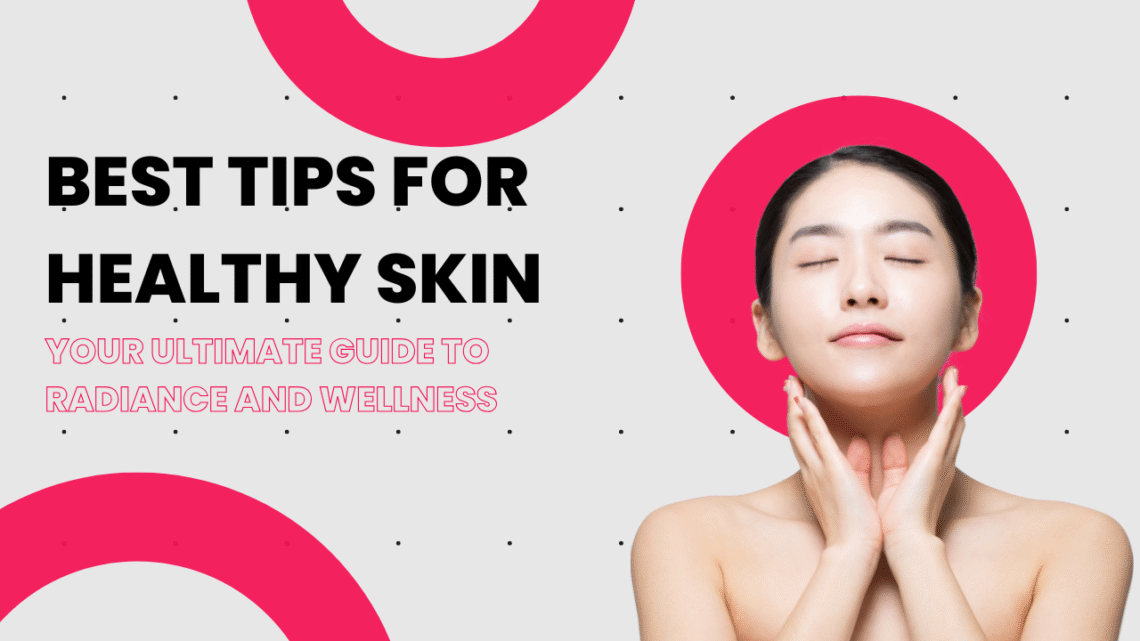Healthy skin is not just about appearances—it’s a reflection of your overall well-being. When your skin is clear, glowing, and hydrated, it shows that your body is functioning well both inside and out. Achieving this level of skin health isn’t about expensive products or complicated routines. Instead, it’s about understanding your skin’s needs and making consistent, science-backed choices in your daily life.
In this comprehensive guide, we’ll explore everything you need to know about nurturing your skin naturally and effectively. From understanding how your skin works to applying the top 8 best tips for healthy skin, you’ll be empowered to build habits that result in long-lasting, radiant skin.
Understanding Your Skin

Before exploring the best tips for healthy skin, it’s important to understand the incredible role your skin plays. As the body’s largest organ, the skin acts as your first line of defense against external elements like bacteria, pollutants, and UV radiation. It protects internal organs, regulates temperature, and plays a vital role in immune function.
Structurally, your skin is composed of three main layers: the epidermis (outer layer), dermis (middle layer), and hypodermis (deepest layer). Each layer has a specific purpose, from creating new skin cells and producing collagen to storing fat and insulating the body. Keeping these layers healthy is essential for maintaining overall skin vitality.
Understanding how your skin functions makes it easier to choose routines and products that truly support it. By focusing on hydration, nutrition, protection, and proper care, you can implement the best tips for healthy skin that promote a natural glow and long-term wellness.
- Protection: Shields you from environmental harm, bacteria, and UV radiation.
- Regulation: Maintains body temperature and prevents water loss.
- Sensation: Contains nerve endings that sense temperature, pain, and pressure.
Skin is made up of three main layers:
- Epidermis: The outermost layer that acts as a protective barrier.
- Dermis: Contains collagen, elastin, sweat glands, and blood vessels.
- Hypodermis: A deep layer of fat and connective tissue that insulates and cushions the body.
Healthy skin is balanced, hydrated, and resilient. Problems like acne, dryness, dullness, or aging occur when this balance is disrupted by external factors or internal imbalances.
Top 8 Best Tips for Healthy Skin
1. Prioritize Sun Protection Daily
One of the best tips for healthy skin is protecting it from harmful UV radiation. Sun exposure remains the primary cause of premature aging, uneven pigmentation, sunspots, and even skin cancer. Over time, repeated exposure to ultraviolet rays can damage skin cells, break down collagen, and accelerate the development of wrinkles.
UV rays are present year-round, even on cloudy days or during the winter. That’s why daily sun protection is non-negotiable for anyone aiming to preserve youthful, radiant skin. Incorporating broad-spectrum sunscreen with an SPF of at least 30 into your morning routine is one of the most effective ways to defend against sun-related damage.
Other best tips for healthy skin include wearing protective clothing, wide-brimmed hats, and sunglasses when outdoors. Reapplying sunscreen every two hours, especially after swimming or sweating, ensures continuous protection. Consistent sun safety helps your skin stay firm, even-toned, and protected for years to come.
What to Do:
- Use broad-spectrum sunscreen with SPF 30 or higher every day.
- Apply it 15–30 minutes before going outdoors, even on cloudy days.
- Reapply every 2 hours, especially after swimming or sweating.
- Wear hats, sunglasses, and protective clothing when spending time outside.
Why It Matters:
UV rays penetrate the skin and damage collagen, leading to wrinkles, sunspots, and even DNA changes that increase cancer risk. Prevention is far easier than reversal.
2. Keep Your Skin Well-Hydrated

Among the best tips for healthy skin is staying well-hydrated. Water plays a critical role in maintaining the skin’s elasticity, smoothness, and natural glow. Hydrated skin appears more plump and vibrant, while dehydration can lead to dullness, fine lines, and a rough texture that’s difficult to manage.
When the skin lacks moisture, it becomes more susceptible to dryness, flakiness, and irritation. This can compromise your skin barrier, making it harder for your skin to protect itself from environmental stressors like pollution and harsh weather. Moisture is not only essential from the inside out but also from the outside in.
To support hydration, drink plenty of water throughout the day and use moisturizers that suit your skin type. Look for ingredients like hyaluronic acid, glycerin, and ceramides. Following hydration-focused practices is one of the best tips for healthy skin and helps maintain a soft, resilient, and radiant complexion long-term.
What to Do:
- Drink at least 8 glasses of water a day.
- Use moisturizers suited to your skin type (gel-based for oily, creamy for dry).
- Look for ingredients like hyaluronic acid, ceramides, and glycerin in products.
- Humidifiers can help during dry weather or winter months.
Why It Matters:
Water helps transport nutrients to skin cells and flush toxins out. A hydrated skin barrier is also better at defending against pollution and irritants.
3. Eat a Skin-Friendly Diet
One of the best tips for healthy skin is paying close attention to your diet. What you eat has a direct impact on your skin’s health, appearance, and ability to repair itself. A nutrient-rich diet helps fuel the regeneration of skin cells and strengthens your body’s natural defenses against inflammation and environmental damage.
Incorporating foods rich in antioxidants, healthy fats, vitamins, and minerals is essential for maintaining a radiant complexion. Vitamin C promotes collagen production, omega-3 fatty acids support skin elasticity, and zinc helps reduce acne and inflammation. Fruits, vegetables, nuts, seeds, and fatty fish are all skin-friendly choices that nourish from within.
Avoiding excess sugar, processed foods, and unhealthy fats is equally important. These can trigger breakouts, dullness, and premature aging. Among the best tips for healthy skin, eating clean and colorful meals regularly ensures your skin receives the nutrients it needs to thrive and glow naturally.
What to Eat:
- Omega-3 fatty acids (salmon, walnuts) for elasticity.
- Antioxidants (berries, leafy greens) to fight free radicals.
- Vitamin C (citrus, bell peppers) for collagen production.
- Zinc and Vitamin E to repair damaged skin.
- Avoid processed foods, refined sugar, and dairy (which can trigger acne in some).
Why It Matters:
Skin reflects your internal health. A diet high in whole, unprocessed foods supports skin regeneration, glow, and resilience against inflammation.
4. Follow a Consistent Skincare Routine
One of the best tips for healthy skin is embracing consistency over complexity. Many people make the mistake of constantly switching products or trying complicated routines, hoping for quick results. However, a simple skincare routine performed regularly is far more effective in maintaining skin health and achieving long-lasting benefits.
By sticking to basic steps—cleansing, moisturizing, and sun protection—you give your skin a chance to adapt and improve over time. Regularity helps reinforce your skin’s natural barrier and prevents irritation caused by frequent changes or overuse of harsh products. It also allows you to track how your skin responds, making it easier to identify what works best for you.
Ultimately, consistency builds trust between you and your skin. Among the best tips for healthy skin, establishing a simple, daily routine that you can follow faithfully is key to glowing, balanced, and resilient skin.
Morning Routine:
- Cleanser: Removes overnight oil buildup.
- Moisturizer: Seals in hydration.
- Sunscreen: Protects from UV damage.
Evening Routine:
- Cleanser: Removes makeup and pollutants.
- Serum or Treatment: Targets specific concerns (e.g., Vitamin C, retinol).
- Moisturizer: Repairs overnight.
Why It Matters:
Your skin thrives on balance. Regular cleansing, moisturizing, and protecting help maintain its natural barrier and prevent damage from environmental stressors.
5. Get Enough Sleep and Manage Stress

Among the best tips for healthy skin, managing sleep and stress is often overlooked but incredibly important. Both chronic stress and insufficient sleep negatively affect your skin’s ability to repair and regenerate. When you don’t get enough restful sleep, your skin can appear dull, tired, and lack its natural glow.
Stress triggers the release of cortisol, a hormone that increases inflammation and oil production in the skin, which can lead to acne breakouts and other skin issues. Over time, chronic stress and poor sleep can accelerate the aging process, causing fine lines, wrinkles, and uneven skin tone.
To support healthy skin, prioritize getting 7–9 hours of quality sleep each night and practice stress-reducing techniques like meditation, deep breathing, or gentle exercise. Incorporating stress and sleep management into your routine is one of the best tips for healthy skin, helping you maintain a radiant and youthful complexion.
What to Do:
- Aim for 7–9 hours of sleep per night.
- Practice relaxation techniques like yoga, meditation, journaling, or deep breathing.
- Take breaks and set boundaries to prevent burnout.
Why It Matters:
During sleep, your body goes into repair mode. Growth hormones regenerate cells, and cortisol levels (linked to inflammation) normalize, helping your skin reset overnight.
6. Avoid Smoking and Limit Alcohol
Among the best tips for healthy skin is avoiding habits that damage your complexion, such as smoking and excessive alcohol consumption. Both smoking and alcohol accelerate the aging process by breaking down collagen and elastin, the proteins responsible for keeping skin firm and elastic. This leads to premature wrinkles, fine lines, and sagging skin.
Smoking also reduces blood flow to the skin, depriving it of oxygen and essential nutrients needed for a healthy glow. Alcohol, on the other hand, dehydrates the skin and can cause inflammation, redness, and a dull complexion. Over time, these effects weaken your skin’s natural defenses against environmental damage.
To maintain youthful and resilient skin, minimizing or eliminating smoking and limiting alcohol intake is crucial. This simple yet powerful habit is one of the best tips for healthy skin, helping you preserve your skin’s vitality and radiant appearance for years to come.
Why Smoking Hurts Skin:
- Reduces oxygen supply and nutrients.
- Breaks down collagen and elastin.
- Causes wrinkles, discoloration, and sagging.
Alcohol’s Effects:
- Dehydrates skin.
- Can cause inflammation and redness.
- Impairs liver function, which is essential for detoxification.
What to Do:
- Quit smoking (seek help or programs if needed).
- If drinking, limit intake and hydrate with water afterward.
7. Exfoliate Gently and Regularly
Exfoliation is one of the best tips for healthy skin because it helps remove dead skin cells that can make your complexion look dull and rough. By clearing away this layer, exfoliation unclogs pores, reducing the chances of breakouts and allowing skincare products to penetrate more effectively. Regular exfoliation encourages faster cell turnover, revealing fresh, glowing skin underneath.
However, it’s important to exfoliate in moderation. Over-exfoliating can damage your skin’s protective barrier, leading to irritation, redness, and increased sensitivity. Using harsh scrubs or exfoliating too frequently can strip away natural oils, causing dryness and making your skin more vulnerable to environmental stressors.
For best results, choose gentle exfoliants suited to your skin type, and limit exfoliation to 1-3 times per week. Incorporating exfoliation thoughtfully into your routine is one of the best tips for healthy skin, promoting a smooth, radiant complexion without irritation.
What to Do:
- Use gentle exfoliants (like AHAs or BHAs) 1–2 times per week.
- Avoid physical scrubs with large, rough particles.
- Consider chemical exfoliants for deeper penetration without abrasion.
Why It Matters:
Proper exfoliation reveals fresher, brighter skin and allows better absorption of skincare products. It can also help prevent acne and dullness.
8. Listen to Your Skin and Choose the Right Products
One of the best tips for healthy skin is understanding that every skin type is unique. Whether your skin is dry, oily, combination, or sensitive, choosing products tailored specifically to your skin’s needs is crucial for maintaining its health and appearance. Using generic products can sometimes worsen issues like dryness, breakouts, or irritation.
For dry skin, focus on hydrating and nourishing formulas that lock in moisture. Oily skin benefits from lightweight, non-comedogenic products that control excess oil without clogging pores. Combination skin often requires a balanced approach, targeting different areas with appropriate treatments. Sensitive skin calls for gentle, fragrance-free options to avoid irritation.
By selecting products suited to your skin type, you maximize their effectiveness and support your skin’s natural balance. Personalizing your skincare routine is among the best tips for healthy skin, helping you achieve a clear, comfortable, and glowing complexion.
What to Do:
- Read product labels.
- Avoid harsh chemicals, artificial fragrances, and alcohol-based toners.
- Patch test new products to prevent allergic reactions.
- See a dermatologist for persistent issues or to build a targeted routine.
Why It Matters:
Personalized care leads to better outcomes. Trial and error may be part of the journey, but being in tune with your skin helps you avoid damage and irritation.
Additional Lifestyle Tips for Skin Wellness
- Exercise regularly to boost circulation and detox through sweat.
- Wash pillowcases and makeup brushes weekly to prevent bacterial buildup.
- Limit hot showers, which can strip away natural oils.
- Use natural fabrics like cotton to avoid irritation.
Common Skin Myths Debunked
- “The more products, the better.” – Not true. Too many layers can irritate skin.
- “Oily skin doesn’t need moisturizer.” – False. All skin types need hydration.
- “Tanning is healthy.” – UV exposure is damaging, even if it results in a tan.
- “Natural products are always safer.” – Natural doesn’t always mean non-irritating. Always check ingredients.
When to See a Dermatologist
If you’re dealing with any of the following, it’s time to seek professional help:
- Severe acne or rosacea
- Persistent dryness or itching
- Sudden rashes or pigmentation
- Signs of skin cancer (moles changing shape or color)
A dermatologist can provide prescription treatments, clinical procedures, or advanced skincare advice tailored to your needs.
Conclusion: Your Skin Reflects Your Lifestyle

Healthy skin isn’t about perfection—it’s about balance, care, and consistency. The top 8 tips above are simple yet powerful tools to help you maintain glowing skin throughout your life. By protecting it from the sun, staying hydrated, nourishing your body, and practicing gentle skincare, you’ll build a strong foundation for lifelong skin health.
Start with small, sustainable changes. Whether it’s drinking more water, using SPF daily, or managing stress, every step matters. Your skin has incredible potential to renew itself—give it the care and patience it deserves, and it will reward you with radiance and resilience.
1. What are the best tips for healthy skin?
Consistency with a simple skincare routine, daily sun protection, proper hydration, balanced nutrition, regular exercise, adequate sleep, stress management, and using products suited to your skin type are some of the best tips for healthy skin.
2. How often should I exfoliate for healthy skin?
Most skin types benefit from exfoliating 1 to 3 times a week. Over-exfoliation can cause irritation, so it’s important to choose gentle exfoliants and adjust frequency based on your skin’s response.
3. Does diet really affect skin health?
Yes! A diet rich in antioxidants, vitamins, and healthy fats supports skin repair and glow, while processed foods and excess sugar can worsen skin issues like acne and inflammation.
4. How important is sunscreen for healthy skin?
Sunscreen is essential. Daily use of a broad-spectrum sunscreen with at least SPF 30 protects skin from UV damage, preventing premature aging, pigmentation, and skin cancer.
5. Can hydration improve my skin?
Absolutely! Drinking enough water and using moisturizers help maintain skin’s elasticity, softness, and barrier function, preventing dryness and irritation.
6. What skincare routine is best for sensitive skin?
A gentle routine with fragrance-free, hypoallergenic products, minimal ingredients, and avoiding harsh exfoliants or irritants is best for sensitive skin.
7. How does stress impact my skin?
Chronic stress increases cortisol levels, which can cause inflammation, acne flare-ups, and accelerate skin aging. Managing stress supports healthier skin.
8. Are expensive skincare products better for healthy skin?
Not necessarily. Effectiveness depends on ingredients and suitability for your skin type. Consistency and choosing quality products with proven ingredients are more important than price.




